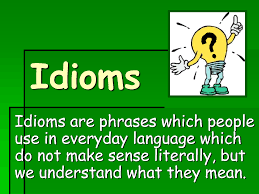LEARN ENGLISH ONLINE With Hamed Mohamadifar
(The perfect environment for rapid language improvement)LEARN ENGLISH ONLINE With Hamed Mohamadifar
(The perfect environment for rapid language improvement)پکیج جامع آموزش تضمینی ۴ مهارت زبان
درود به شما همراهان و علاقه مندان همیشگی بلاگ learnenglishonline.blogsky.com .
یادگیری مهارت های مکالمه با پکیج طلایی و جامع آموزش تضمینی ۴ مهارت زبان
تهیه و در دسترس شما عزیزان قرار گرفته است. دانلود از این لینک امکان پذیر است.:
ترجمه تخصصی رشته های زیر پذیرفته می شود
مهندسی برق
- مهندسی مکانیک
- مهندسی عمران
- مهندسی کامپیوتر
- مهندسی صنایع
- مهندسی شیمی
- مهندسی مواد و متالورژی
- مهندسی معدن
- مهندسی نفت
- مهندسی هوافضا
- مهندسی هستهای
- مهندسی پزشکی
- مهندسی محیط زیست
- مهندسی انرژی
- مهندسی شهرسازی
- مهندسی نقشهبرداری
- مهندسی حمل و نقل
- مهندسی معماری
ترجمه متون رشته های علوم پایه شامل موارد زیر نیز پذیرفته می شود :
- ریاضیات و کاربردها
- آمار
- فیزیک
- شیمی
- زیستشناسی
- زمینشناسی
- علوم محیطی
ترجمه متون تمامی رشتهها با ۲۰ سال سابقه
جهت دریافت نرخ خدمات ترجمه از قسمت تماس با من اقدام کنید
✨ خدمات ترجمه تخصصی فارسی ↔ انگلیسی با ۲۰ سال سابقه
Translation Service Persian >English & English >Persian
✨ خدمات ترجمه تخصصی فارسی ↔ انگلیسی با ۲۰ سال سابقه
اگر به دنبال ترجمهای دقیق، روان و کاملاً تخصصی هستید، جای درستی آمدهاید.
با ۲۰ سال تجربه حرفهای در زمینه ترجمه فارسی به انگلیسی و انگلیسی به فارسی، آماده ارائه خدمات ترجمه در تمامی رشتهها و حوزهها هستم.
✅ ترجمه تخصصی مقالات علمی و دانشگاهی
✅ ترجمه متون پزشکی، مهندسی، حقوقی، مدیریت و بازرگانی
✅ ترجمه پایاننامه، کتاب، رزومه و مکاتبات رسمی
✅ ترجمه متون عمومی و تخصصی با کیفیت بالا
✅ تحویل سریع + رعایت کامل اصول نگارشی و تخصصی
هدف ما ارائه ترجمهای است که نهتنها درست باشد، بلکه کاملاً طبیعی و حرفهای به زبان مقصد نوشته شود. جهت سفارش از قسمت تماس با من در بلاگ اقدام کنید
پکیج جامع آموزش تضمینی ۴ مهارت زبان
درود به شما همراهان و علاقه مندان همیشگی بلاگ learnenglishonline.blogsky.com . طبق قول قبلی که بهتون دادم و درخواست های چندین و چند باره شما دوستان مبنی بر آموزش و یادگیری مهارت های مکالمه پکیج طلایی و جامع آموزش تضمینی ۴ مهارت زبان تهیه و در دسترس شما عزیزان قرار گرفته است.
وقتی این مهارتها رو یاد بگیرید، از دستاوردهای خود شگفتزده خواهید شد:
ارتباط راحتتر و گستردهتر با دیگران:
با یادگیری زبان جدید، میتونید به راحتی با افراد از سراسر جهان ارتباط برقرار کنید و دایره ارتباطاتتون رو به طرز چشمگیری گسترش بدید.
اعتماد به نفس بالا
تسلط به زبان جدید باعث میشه در هر موقعیتی احساس قدرت و اعتماد به نفس کنید، به خصوص در سفرها، موقعیتهای اجتماعی و شغلی.
فرصتهای شغلی و حرفهای بیشتر
داشتن مهارت زبانهای جدید به شما امکان میده که به راحتی وارد بازارهای بینالمللی بشید و فرصتهای شغلی بهتری پیدا کنید.
یادگیری مهارتهای جدید و تقویت ذهن
یادگیری زبان باعث میشه ذهن شما فعال بمونه، حافظه و توانایی حل مسئله تقویت بشه، و حتی بر سلامت مغز تاثیر مثبت بذاره.
چطوری میشه ثبت نام کرد؟
ثبت نام از ۱۸ بهمن ۱۴۰۴ شروع شده و تا ۲۰ بهمن ادامه داره. برای دریافت فایل دوره به این آیدی در اینستاگرام @m.english.l پیام بدید.
یا از طریق این لینک فایل دوره رو دانلود کنید.
جهت دریافت رمز عبور به آیدی بالا دایرکت بدید.
April Fool's Day
روز اول آوریل که به «April Fools' Day» یا «روز شوخی» معروفه، یک سنت سالانهست که در بسیاری از کشورهای غربی و بهخصوص در فرهنگهای انگلیسیزبان برگزار میشه. این روز به طور خاص به شوخی کردن، فریب دادن دیگران به صورت بیضرر و خندهدار اختصاص داره. در ادامه برات کامل توضیح میدم:
تاریخچه و ریشه
ریشهی دقیق «April Fools' Day» کاملاً مشخص نیست، ولی یکی از نظریههای رایج به قرن شانزدهم در اروپا برمیگرده. در سال ۱۵۶۴، فرانسه تقویم خودش رو از تقویم ژولیانی به تقویم گریگوری تغییر داد. توی تقویم قدیمی، سال نو نزدیک به آخر مارس یا اوایل آوریل جشن گرفته میشد، ولی با تقویم جدید، سال نو به اول ژانویه منتقل شد. بعضیها که به این تغییر عادت نداشتن یا نمیخواستن قبولش کنن، همچنان توی اوایل آوریل جشن میگرفتن و مردم به شوخی اونا رو «احمقهای آوریل» (April Fools) صدا میکردن. این سنت کمکم به یک روز رسمی برای شوخی و سرگرمی تبدیل شد.
نظریهی دیگه به جشنهای باستانی مثل «هیلاریا» (Hilaria) در روم باستان یا جشنوارهی «هولی» (Holi) در هند اشاره داره که هر دو با خنده، شادی و گاهی فریب دادن همراه بودن.
رسم و رسوم
توی این روز، مردم سعی میکنن با شوخیهای بیضرر و بامزه بقیه رو گول بزنن. این شوخیها میتونه از یه دروغ ساده مثل «بند کفشم باز شده» (وقتی کفش بند نداره!) تا نقشههای پیچیدهتر باشه. معمولاً وقتی طرف مقابل فریب میخوره، شوخیکننده فریاد میزنه «April Fool!» (احمق آوریل!) تا نشون بده که همهچیز فقط یه شوخی بوده.
• رسانهها: خیلی از روزنامهها، سایتها و شبکههای تلویزیونی هم توی این روز اخبار جعلی و خندهدار منتشر میکنن. مثلاً بیبیسی یه بار گزارش داد که «درخت اسپاگتی» توی سوئیس کشف شده و مردم باور کردن!
• محدودیت زمانی: توی بعضی کشورها مثل بریتانیا، شوخیها فقط تا ظهر اول آوریل معتبرن و اگه بعد از اون کسی شوخی کنه، خودش «احمق» حساب میشه.
در فرهنگهای مختلف
• فرانسه: بهش میگن «Poisson d'Avril» (ماهی آوریل) و بچهها سعی میکنن یه ماهی کاغذی رو یواشکی به پشت لباس بقیه بچسبونن.
• اسکاتلند: اونجا دو روزهست! روز اول به اسم «Hunt the Gowk» (شکار احمق) و روز دوم به شوخیهای فیزیکی مثل گذاشتن بالشتک بادکنکی زیر صندلی اختصاص داره.
• ایران: توی فرهنگ ایرانی معادل مستقیمی برای این روز نداریم، ولی نزدیکترین سنت میتونه «سیزدهبهدر» باشه که روز سیزدهم فروردین (دوم آوریل) برگزار میشه و گاهی با شوخی و دروغ مصلحتی همراهه، مثل «دروغ سیزده».
مثالهای معروف
• گوگل: هر سال توی اول آوریل، گوگل با ایدههای عجیب مثل «گوگل鼻子» (جستجو با بو!) کاربرهاش رو سرگرم میکنه.
• برگر کینگ: یه بار تبلیغ «برگر دست چپ» رو برای چپدستها منتشر کرد که خیلیها جدی گرفتن!
چرا هنوز محبوب است؟
این روز به آدما اجازه میده یه کم از جدیت زندگی فاصله بگیرن و با خنده و شوخی به هم نزدیکتر بشن. توی دنیای مدرن که استرس زیاده، همچین روزی مثل یه فرصت برای رها شدن عمل میکنه.
April Fools' Day, also known as April Fools' Day, is an annual tradition celebrated in many Western countries, especially in English-speaking cultures. It is a day dedicated to playing pranks, tricking others in a harmless and humorous way. Here's a full explanation:
History and Origins
The exact origins of April Fools' Day are not entirely clear, but one popular theory dates back to 16th-century Europe. In 1564, France changed its calendar from the Julian to the Gregorian calendar. In the old calendar, New Year's was celebrated near the end of March or early April, but with the new calendar, New Year's was moved to January 1. Some, who were not used to this change or did not want to accept it, continued to celebrate in early April, and people jokingly called them "April Fools." This tradition gradually turned into an official day for fun and frolic.
"تبریک سال نو و آغاز دوبارهی یادگیری با هم"
سلام به همهی شما دوستان عزیز و همراهان همیشگی وبلاگ learnenglishonline.blogsky.com!
اول از همه، سال نو رو بهتون تبریک میگم و امیدوارم سالی پر از موفقیت، شادی و یادگیری پیش رو داشته باشید. خیلی خوشحالم که دوباره اینجام و میتونم با شما در این فضای آموزشی همراه باشم.
ممنونم که تا امروز با وبلاگ ما همراه بودید؛ ۴۵ هزار بازدید نشون میده که محتواهایی که براتون آماده کردم، تونسته توجهتون رو جلب کنه و مفید باشه. از این به بعد هم قول میدم مطالب ارزشمند و کاربردی رو براتون به اشتراک بذارم که نه تنها به یادگیری زبان کمک کنه، بلکه اعتماد شما رو به این مسیر بیشتر کنه.
به زودی کلی مطالب جدید و پکیجهای آموزشی جذاب اینجا در دسترستون قرار میگیره، پس با من همراه باشید!
با آرزوی بهترینها برای شما،
حامد محمدی فر
A NOTE FROM THE BLOG MANAGER

Great teachers do it all. They have to. Across all ages, languages, ethnicities, and subjects, teachers are, and need to be, some of the most widely skilled people around in order to be successful. A day in the life of a teacher can vary greatly depending on the subject and grade level in which they teach. From Kindergarten to high school and special education to statistics, one theme runs consistently throughout every great teacher’s career: their job does not end with the school day. Although standing in front of the classroom is a huge part of a teacher’s responsibilities, they extend far beyond that into the lives of their students, their students’ families and their community. A great teacher may help a student-in-need after class, attend PTA meetings and root on the school’s baseball team on the weekend. A great teacher may also attend relevant conferences, network with other teachers and engage in continuing education to stay at the forefront of their specialty. Great teachers teach, and we all know that. Great teachers also do so much more. Great teachers motivate, inspire and lead. They interact with their community to affect positive change through their students and themselves. Great teachers change lives. Great teachers do it all. You can become a great teacher.
Learn the Best Essential Idioms and Phrasal Verbs in English
ESSENTIAL IDIOMS IN ENGLISH by ROBERT J. DIXSON
To own your copy of this book click on the following link
Password: learnenglishonline.blogsky.com

Learn many languages for free
Click on the following link to be directed to the site:
Simply choose the language you want to learn

Jack C. Richards - Key Issues in Language Teaching - Video
Professor Jack C. Richards is interviewed by Professor Merrill Swain about his new book, "Key Issues in ...
Jack C. Richards - Video
Saludo de Jack C. Richards creador del Libro Interchange, usado en Smart. Dr. Richards is an ...
JACK C. RICHARDS - Creativity in Language Teaching - Video
JACK C. RICHARDS - Creativity in Language Teaching. Global Conversations in ... Retrieved from https ...
Jack C. Richards on the Take Away Value of a Lesson - Video
In this video, Professor Jack C. Richards discusses the take away value of a lesson.
Jack C. Richards on Task Based Language Learning - Video
In this video cast, Professor Jack C. Richards discusses task based language learning.
Jack C. Richards on Observing Teaching - Video
In this video cast, Professor Jack C. Richards discusses observing teaching.
Jack C. Richards - Approaches and Methods in Language Teaching - Video
Professor Jack C. Richards is interviewed by Professor Hayo Reinders about his new book, "Approaches and ...
Jack C. Richards on Teaching Principles - Video
In this video cast, Professor Jack C. Richards discusses teaching principles.